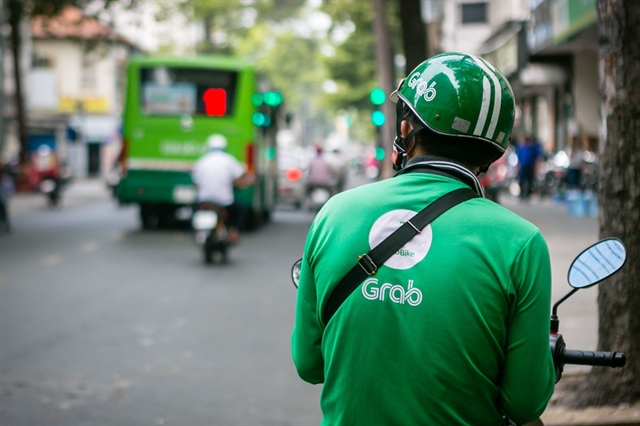 Economy
Economy

The rail-hailing app Grab’s recent move to increase fees triggered concerns among drivers that they would earn less as passengers switch to other transportation service providers.

|
| Grab drivers are worried that the fee increases would affect their incomes as passengers might choose other apps instead. — Photo saigonneer.com |
HÀ NỘI — The rail-hailing app Grab’s recent move to increase fees triggered concerns among drivers that they would earn less as passengers switch to other transportation service providers.
The Grabcar and GrabBike fees were raised by around 5-6 per cent, starting from December 5, to ensure drivers’ income, as Grab said, when value-added tax (VAT) increased following Decree No 126 detailing some points of the Law on Tax Management which took effect the same day.
Accordingly, 4-seat GrabCar service fees in Hà Nội, Bắc Ninh, HCM City, Bình Dương, Đồng Nai and Cần Thơ increased VNĐ2,000 to VNĐ27,000 for the first two kilometres. The fees in Hải Phòng, Quảng Ninh and Đà Nẵng rose by VNĐ3,000 to VNĐ25,000. The fees increased by VNĐ500-1,000 for each subsequent kilometre.
The GrabBike service fees increased from VNĐ3,400 to VNĐ4,000 per kilometre after the first two kilometres.
Before Decree 126 came into effect, drivers paid VAT of 3 per cent on what they received and Grab paid VAT of 10 per cent on the revenue the company collected.
Under the new decree, Grab must pay VAT of 10 per cent on the total revenue passengers paid for each ride.
Grab estimated that if the fees were not increased, their drivers’ income would fall by around seven per cent per year.
The company said that the increases in fees would help reduce drops in drivers’ income to 1 per cent per year, and that the fees remained competitive in the market.
For GrabBike service, Grab now collected 27.2 per cent, from 25 per cent, which included 20 per cent of the service fee for the app and VAT (excluding 1.5 per cent personal income tax if their annual income was from VNĐ100 million or higher). For GrabCar, Grab collected 32.8 per cent, from 28.3 per cent, including the app service fee of 25 per cent.
The increases in Grab fees was met with objections from drivers as many of them turned off the apps on Monday.
Drivers were worried their incomes would be affected as passengers would switch to other transportation services providers as the market in Việt Nam was seeing increasing competition with the participation of a number of players.
Nguyễn Mạnh Tùng, a Grab driver in Hà Đông, Hà Nội, said the higher fees would cause passengers to avoid using Grab services, meaning drivers’ income would drop.
‘It is really hard for drivers with the growing competition and Grab collecting high commission fees,” he said.
Nguyễn Thu Hương in Linh Đàm, Hà Nội, said that she used to book Grab rides due to their convenience and attractive promotions which made the fees low. However, she was shocked when the Grab fee for her daily commute increased from VNĐ40,000 to more than VNĐ50,000, causing her to consider public transport instead.
Expert Đinh Thế Hiển said that it was important to harmonise the benefits of the company, drivers and passengers.
Food delivery app Beamin recently announced increases in the commission fees from 20 per cent to 27.2 per cent.
A representative from Be Group said that the company was waiting for a circular detailing the decree to identify taxable incomes and support its drivers to comply with the tax regulations.
Gojek Việt Nam said that there might be some adjustments but it was studying the best solutions. — VNS




